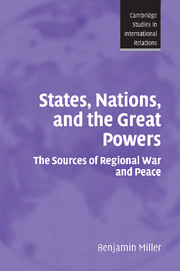Crossref Citations
This Book has been
cited by the following publications. This list is generated based on data provided by Crossref.
Rynhold, Jonathan
2008.
The Failure of the Middle East Peace Process?.
p.
111.
Miller, Benjamin
2008.
States, Nations, and Regional War.
Ethnopolitics,
Vol. 7,
Issue. 4,
p.
445.
Miller, Benjamin
2008.
States, Nations, and Regional War: A Response to Toft, Saideman and Wolff.
Ethnopolitics,
Vol. 7,
Issue. 4,
p.
475.
Wolff, Stefan
2008.
COMMENT: State-to-Nation Imbalance as a Cause for Regional War: The German Question as a Test Case.
Ethnopolitics,
Vol. 7,
Issue. 4,
p.
471.
Gillis, Stacy
2008.
Noticeboard.
Journal of War & Culture Studies,
Vol. 1,
Issue. 2,
p.
201.
Resnick, Uri
2008.
Territorial Disputes: Perspectives on the Israeli—Palestinian Conflict.
Israel Journal of Foreign Affairs,
Vol. 2,
Issue. 3,
p.
87.
E. Lobell, Steven
2009.
Neoclassical Realism, the State, and Foreign Policy.
p.
42.
Abulof, Uriel
2009.
“Small Peoples”: The Existential Uncertainty of Ethnonational Communities.
International Studies Quarterly,
Vol. 53,
Issue. 1,
p.
227.
Rasler, Karen
and
Thompson, William R.
2011.
Borders, Rivalry, Democracy, and Conflict in the European Region, 1816-1994.
Conflict Management and Peace Science,
Vol. 28,
Issue. 3,
p.
280.
RYNHOLD, JONATHAN
2011.
The German question in Central and Eastern Europe and the long peace in Europe after 1945: an integrated theoretical explanation.
Review of International Studies,
Vol. 37,
Issue. 1,
p.
249.
Levin, Dov H.
and
Miller, Benjamin
2011.
Why Great Powers Expand in Their Own Neighborhood: Explaining the Territorial Expansion of the United States 1819–1848.
International Interactions,
Vol. 37,
Issue. 3,
p.
229.
Florio, Simone
2011.
The Fragmentation of Geopolitical Space: What Secessionist Movements Mean to the Present-Day State System.
SSRN Electronic Journal,
Cederman, Lars-Erik
Warren, T. Camber
and
Sornette, Didier
2011.
Testing Clausewitz: Nationalism, Mass Mobilization, and the Severity of War.
International Organization,
Vol. 65,
Issue. 4,
p.
605.
2012.
Erdbeeren und Piraten.
p.
295.
MILLER, BENJAMIN
2012.
Does Democratization Pacify the State? The Cases of Germany and Iraq1.
International Studies Quarterly,
Vol. 56,
Issue. 3,
p.
455.
Copeland, Dale C.
2012.
International Relations Theory and Regional Transformation.
p.
49.
Resnick, Uri
2012.
Explaining post-independence conflict.
Dynamics of Asymmetric Conflict,
Vol. 5,
Issue. 1,
p.
31.
Miller, Benjamin
2012.
Regional threats and global management of conflicts in regions: The case of the US in the Middle East.
International Politics,
Vol. 49,
Issue. 3,
p.
346.
Huq Pramanik, Ataul
2012.
Development and democratization from the perspective of Islamic world view.
Humanomics,
Vol. 28,
Issue. 1,
p.
5.
Paul, T. V.
2012.
International Relations Theory and Regional Transformation.
p.
3.



